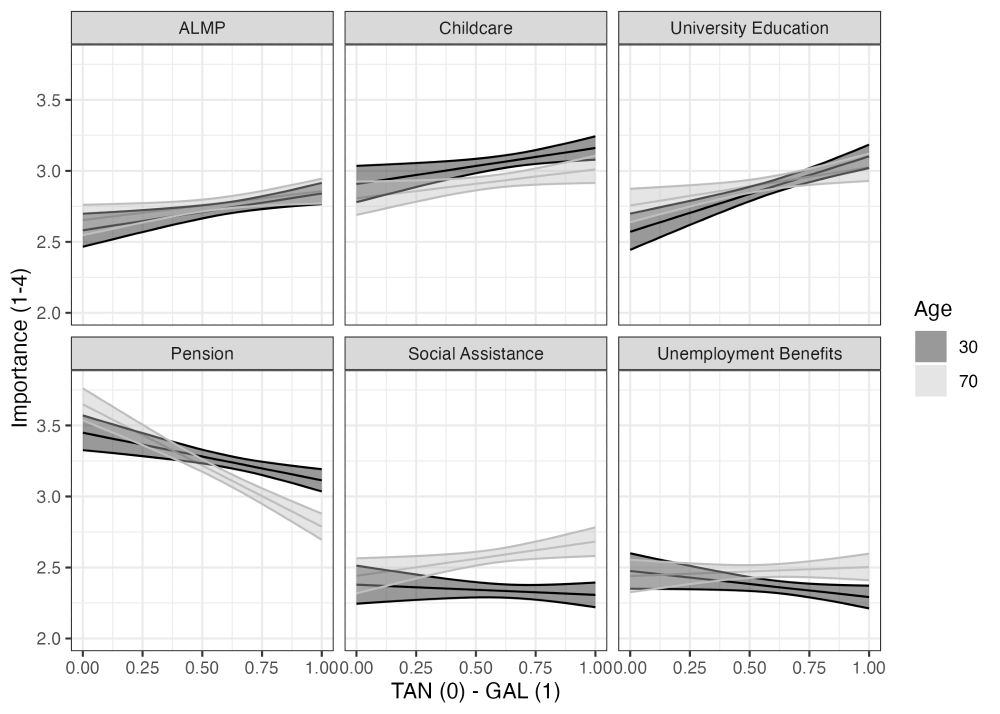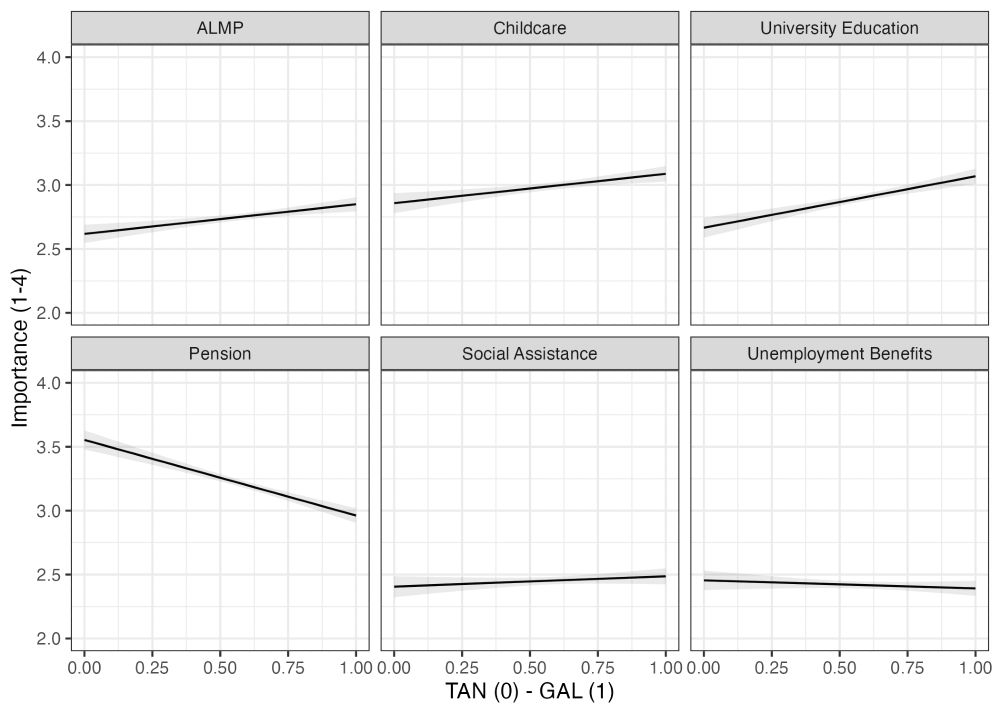Matthias Enggist
@matthiasenggist.bsky.social
Postdoctoral researcher in Political Science at
University of Lausanne | PhD @IPZ, University of Zurich | welfare state politics, public opinion, party competition, immigration, political geography
University of Lausanne | PhD @IPZ, University of Zurich | welfare state politics, public opinion, party competition, immigration, political geography
9/ Many thanks to @macarenaares.bsky.social, @alexanderhorn.bsky.social, @evehubscher.bsky.social and many others for providing invaluable feedback on previous versions of this paper.
March 4, 2025 at 6:06 PM
9/ Many thanks to @macarenaares.bsky.social, @alexanderhorn.bsky.social, @evehubscher.bsky.social and many others for providing invaluable feedback on previous versions of this paper.
8/ 🟢 Generational differences among GAL voters may reshape the future of social policies directed at the most vulnerable groups. If differences reflect cohort effects (as we assume but cannot empirically test), social assistance could soon lose one of its key support groups.
March 4, 2025 at 6:06 PM
8/ 🟢 Generational differences among GAL voters may reshape the future of social policies directed at the most vulnerable groups. If differences reflect cohort effects (as we assume but cannot empirically test), social assistance could soon lose one of its key support groups.
7/ What does this tell us?
🟢 The second dimension of political conflict matters for welfare preferences – it shapes which specific welfare programs are prioritized.
🟢 The second dimension of political conflict matters for welfare preferences – it shapes which specific welfare programs are prioritized.
March 4, 2025 at 6:06 PM
7/ What does this tell us?
🟢 The second dimension of political conflict matters for welfare preferences – it shapes which specific welfare programs are prioritized.
🟢 The second dimension of political conflict matters for welfare preferences – it shapes which specific welfare programs are prioritized.
6/ These age difference findings are almost exclusively driven by West Germany (as we expected), where early GAL mobilization was more closely tied to left-wing, anti-capitalist movements than in East Germany.
March 4, 2025 at 6:06 PM
6/ These age difference findings are almost exclusively driven by West Germany (as we expected), where early GAL mobilization was more closely tied to left-wing, anti-capitalist movements than in East Germany.
5/ However, younger GAL voters, socialized in a context, in which the GALTAN cleavage is dominated by the radical right, do not attach particular importance to social assistance. What they really care about is social investment.
March 4, 2025 at 6:06 PM
5/ However, younger GAL voters, socialized in a context, in which the GALTAN cleavage is dominated by the radical right, do not attach particular importance to social assistance. What they really care about is social investment.
4/ Among elderly GAL voters, who were socialized into the GALTAN cleavage when it was dominated by post-1968 New Social Movements, the importance of social assistance benefits is higher than among TAN voters.

March 4, 2025 at 6:06 PM
4/ Among elderly GAL voters, who were socialized into the GALTAN cleavage when it was dominated by post-1968 New Social Movements, the importance of social assistance benefits is higher than among TAN voters.
3/ Meanwhile, TAN voters strongly favor pensions – more so than GAL voters. The picture is less clear for social assistance and unemployment benefits, but we uncover important age differences in how GAL voters see social assistance.
March 4, 2025 at 6:06 PM
3/ Meanwhile, TAN voters strongly favor pensions – more so than GAL voters. The picture is less clear for social assistance and unemployment benefits, but we uncover important age differences in how GAL voters see social assistance.
2/ In line with previous research (e.g. @garritzmannj.bsky.social, @mbusemeyer.bsky.social, @eneimanns.bsky.social), we show that GAL voters are more supportive of and find expansion more important for social investment policies (university education, childcare, active labour market policies).

March 4, 2025 at 6:06 PM
2/ In line with previous research (e.g. @garritzmannj.bsky.social, @mbusemeyer.bsky.social, @eneimanns.bsky.social), we show that GAL voters are more supportive of and find expansion more important for social investment policies (university education, childcare, active labour market policies).
1/ Using original survey data from 🇩🇪, we show that GAL and TAN voters differ in their welfare preferences (measured by positions, importance and conjoint experiments) - even when controlling for first dimension, economic attitudes.
March 4, 2025 at 6:06 PM
1/ Using original survey data from 🇩🇪, we show that GAL and TAN voters differ in their welfare preferences (measured by positions, importance and conjoint experiments) - even when controlling for first dimension, economic attitudes.
We measure welfare chauvinism policies using ImmigSR data, which Eloisa collected w/Friederike Römer and Jakob Henninger.
Thanks to European Political Science Review for giving us a home & those who gave feedback on drafts: @julianachueri.bsky.social , Silja Häusermann, Samir Negash, Leonce Röth.
Thanks to European Political Science Review for giving us a home & those who gave feedback on drafts: @julianachueri.bsky.social , Silja Häusermann, Samir Negash, Leonce Röth.
December 6, 2023 at 11:05 AM
We measure welfare chauvinism policies using ImmigSR data, which Eloisa collected w/Friederike Römer and Jakob Henninger.
Thanks to European Political Science Review for giving us a home & those who gave feedback on drafts: @julianachueri.bsky.social , Silja Häusermann, Samir Negash, Leonce Röth.
Thanks to European Political Science Review for giving us a home & those who gave feedback on drafts: @julianachueri.bsky.social , Silja Häusermann, Samir Negash, Leonce Röth.

